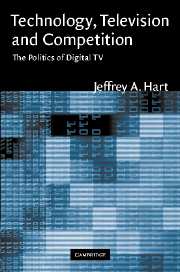Book contents
- Frontmatter
- Contents
- Preface
- Acknowledgments
- List of acronyms
- 1 Introduction
- 2 The institutional setting for advanced TV
- 3 Digital convergence: consumer electronics
- 4 HDTV in Japan
- 5 HDTV in the United States
- 6 HDTV in Europe
- 7 Digital television in the United States
- 8 Digital television in Europe and Japan
- 9 Examples of global standards
- 10 Conclusions
- Index
Preface
Published online by Cambridge University Press: 22 September 2009
- Frontmatter
- Contents
- Preface
- Acknowledgments
- List of acronyms
- 1 Introduction
- 2 The institutional setting for advanced TV
- 3 Digital convergence: consumer electronics
- 4 HDTV in Japan
- 5 HDTV in the United States
- 6 HDTV in Europe
- 7 Digital television in the United States
- 8 Digital television in Europe and Japan
- 9 Examples of global standards
- 10 Conclusions
- Index
Summary
High definition television (HDTV) became a contentious issue in American politics after the European Community rejected a bid in 1986 by the Japanese national broadcasting company, Nippon Hoso Kyokai (NHK), to have its HDTV production method adopted as an international standard. The US government supported the Japanese effort initially, but after the European rejection many people in the United States began to question that support. For some, the Japanese HDTV initiative raised concerns about the relative decline in US competitiveness, even in high technology industries, and the need to respond more effectively to the increased competition from Japan and Western Europe. For others, HDTV was important because it might affect a wide range of industries – broadcasting, film, video, consumer electronics, computers, and telecommunications – and therefore needed to be considered more carefully before buying into the Japanese approach. As a result, the United States began a process to choose a standard for advanced TV that took until April 1997 to reach its conclusion. The US choice of a digital television (DTV) standard forced both Japan and Europe to reexamine their earlier decisions on HDTV. This book is about the forces behind these events.
- Type
- Chapter
- Information
- Technology, Television, and CompetitionThe Politics of Digital TV, pp. ixPublisher: Cambridge University PressPrint publication year: 2004



